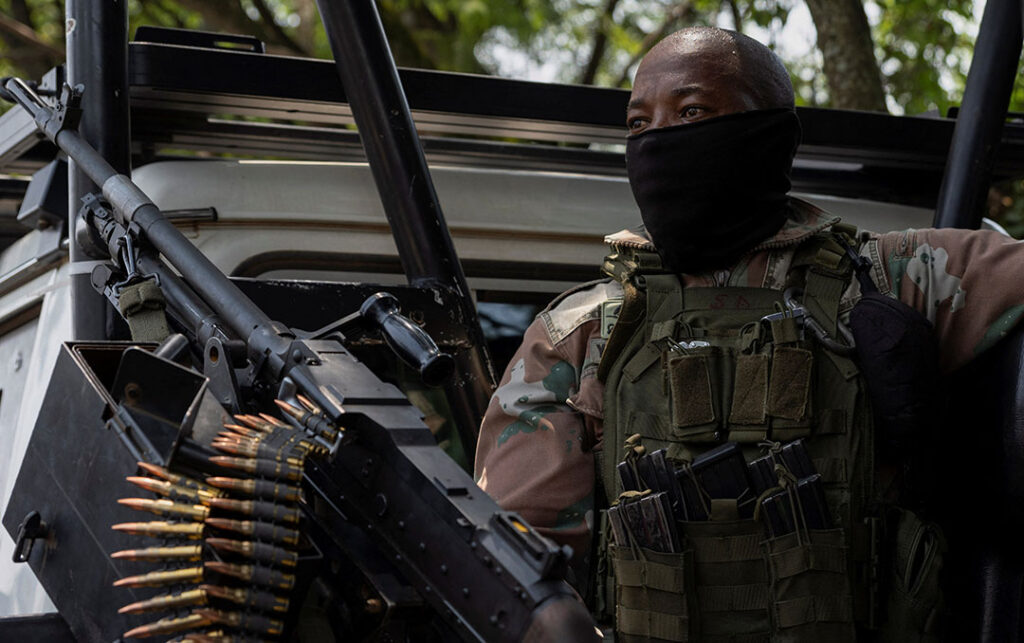ADF STAFF
The recent deaths of South African Soldiers, deployed in December to confront M23 rebels in the eastern Democratic Republic of the Congo (DRC), have South African opposition groups questioning the mission and the resources available to the troops.
“The reality is that the SANDF (South Africa National Defence Force) does not have the capacity to effectively pursue an anti-insurgency campaign against the M23 rebels and neither does it have the prime mission equipment to support the ground forces,” Kobus Marais, a member of the Democratic Alliance said in a statement about the deployment, released on the alliance’s website.
Marais further described the deployment as “a reckless decision that will potentially place the lives of our uniformed forces at severe risk.”
M23 is the most prominent of more than 100 armed groups operating in resource-rich eastern DRC, which has experienced relentless conflict since the 1990s.
“Perhaps the greatest risk that the SANDF faces is that their adversary, the M23 rebels, has operated in the eastern DRC for many years and are familiar with the terrain,” Marais said.
In an interview with the BBC, analyst Remadji Hoinathy of the Institute for Security Studies, said opposition leaders are doing their job by questioning the government. However, he added, South Africa is using its position as a regional leader to help make Africa a more peaceful place.
“The South African Army has proven its worth against insurgencies in the past,” Hoinathy said. “South Africa is again back to playing this role to solve the problem in the region.”
South African Minister of Defence and Military Veterans Thandi Modise said peacekeeping is an important part of the SANDF’s mandate. She called claims that SANDF troops were poorly prepared for their DRC mission “a blue lie.”
The SANDF has sent 2,900 Soldiers to the eastern DRC as the majority of a 5,000-member mission by the Southern African Development Community that includes troops from Malawi and Tanzania. The SACD Mission in the DRC (SAMIDRC) is tasked with helping the DRC’s own military (FARDC) bring M23 to heel.
SAMIDRC replaced a mission by the East African Community (EAC) after DRC President Félix Tshisekedi expelled the EAC after a year saying the mission had been ineffective.
The SADC contingent is significantly smaller than the 6,500 to 12,000 soldiers the East African Community Regional Force originally planned to send to the region before being expelled after just over a year. It is about one-third the size of the United Nations’ MONUSCO peacekeeping mission, which has been operating in the eastern DRC since 1999 and will withdraw in December.
Two South African Soldiers were killed and three more wounded in a M23 mortar attack on their base in mid-February. Two other South African Soldiers died in an apparent murder/suicide while on deployment in late February.
M23’s used of heavy weapons — an unusual tactic for armed insurgencies — is causing widespread death and destruction among the civilian population of North Kivu. The Red Cross says 40% of the people seeking care and health centers are victims of shelling.
Financial constraints have forced South African forces to deploy to the North Kivu region without their Denel Rooivalk attack helicopters to provide air cover to ground troops. The helicopters, which were effective against M23 in earlier deployments, have been grounded due to a lack of funds to maintain them. As a result, the South African Air Force’s Oryx transport helicopters have been attacked repeatedly by small arms fire. Observers say M23 forces have access to surface-to-air missiles, GPS-guided mortars and other high-tech weaponry unusual for such militias.
The SAMIDRC deployment amounts to about 10% of South Africa’s 30,000 military personnel. The recent attacks, and the potential for more, deadlier ones, has other South African opposition leaders questioning the degree to which the mission against M23 is in South Africa’s best interests.
Freedom Front Plus leader Pieter Groenewald recently declared that the SANDF deaths and the lack of key equipment are dampening morale among the troops on the ground.
“They do not understand why their lives are being endangered in a conflict that has nothing to do with South Africa,” Groenewald said in a recent statement.

